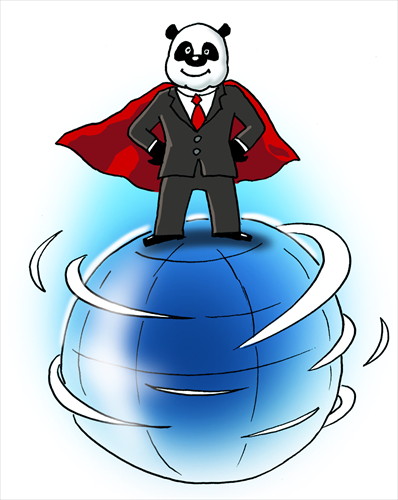China poised to seize heights of tech changes

Illustration: Liu Rui/GT
Editor's Note:
The Boao Forum for Asia was concluded on Sunday in Southern China's Hainan Province. The 2015 annual conference was themed "Asia's New Future: Toward a Community of Common Destiny." What do Chinese entrepreneurs think of the forum? What opportunities will the forum bring to them? The Global Times invited two entrepreneurs to share their views.
Shi Lirong, president of ZTE Corporation
At the Boao forum, I feel strongly about the opportunities that have been created for Chinese enterprises by the times. Be it the proposed Asian Community of Common Destiny or the "One Belt and One Road" initiative, they are translating opportunities arising from China's development into global ones and vice versa. This thinking also applies to companies committed to global innovation and branding.
Over the past 30 years since ZTE Corp was established, we have turned every opportunity into success. In such great times, we focus on science and technology and innovation, and meanwhile envision going global. Our strategic focus on innovation leads to our tremendous technological advances and current leading position.
China holds the heights of hardware design, mass production and mobile Internet applications; the US takes the lead in branding, technologies and new business model. We have connected the two and make their advantages complementary, which facilitates our global development.
In 2014, the whole shipment of ZTE terminal mobile phones reached 100 million, including 48 million smartphones. Thanks to its innovation and proprietary technologies, the ZTE products rank the fourth in terms of general mobile phone and smartphone in the US market, taking a larger share of the US market than any other Chinese peers. This has helped promote the global strategy of ZTE Corp.
With its sales, human resources and manufacturing globalized, the ZTE Corp now envisages a new concept of global distribution that will make the brand more competitive and improve global users' living quality.
Chinese enterprises need reliable products and brands to gain a position in the global market, but this ultimately depends on their patents. ZTE Corp ranks the third globally on the patent applications made through the Patent Cooperation Treaty, remaining in the top three for five years in a row.
ZTE Corp is already a global high-tech company and the only Chinese brand that has truly achieved globalization, but there is still much improvement yet to be made. As the Boao Forum seeks a new start line for building an Asian community of common destiny with cooperation, it is also a good time for ZTE Corp and other Chinese high-tech enterprises to embark on a brand new path.
Zhou Hongyi, CEO and chairman of Qihoo 360 Technology Co. Ltd.
In his work report at the just concluded two sessions, Chinese Premier Li Keqiang stressed that more investment should go to the Internet, and put forward an "Internet Plus" strategy.
Like chemistry, Internet Plus will prompt all industries to react with the Internet. The result will go beyond a simple combination between traditional industries and the Internet, and be a reshaping of all industries through the Internet. New business models will emerge.
Internet Plus is closely related to another term, IOT, which is an abbreviation for "Internet of Things." Aiming at connecting all things, Internet Plus will bring about the fourth industrial revolution for manufacturing.
IOT embodies the era of Internet 3.0. Internet 1.0 is characterized as the expansion of personal computers (PC), while mobile devices such as smartphones have ushered us into the era of Internet 2.0. For the first time in history, it is the mobile web that connects the majority of humanity. Compared with PC-based Internet, the mobile web is more convenient and strong.
In the age of IOT, almost every object can be embedded with intelligent technology, be they small wearables such as spectacles, ties and shoes, or large items such as refrigerators, cars or even planes. These terminal devices can connect the Internet 24/7. When the number of devices like these grows to 30 to 50 billion, the age of big data will have truly arrived, and artificial intelligence will not be just a dream.
Making full use of IOT, which now connects billions of people across the globe, Internet Plus can transform the current industries by forging, reinforcing and streamlining interconnections. Internet Plus may turn many traditional industries upside down, such as finance, tourism and hotel industry.
The irreversible trend of IOT and Internet Plus will push the transition of most traditional enterprises into Internet-based companies. Their conventional business models will also turn into Internet services. Profitable models in the future will focus on long-term and interactive connections with customers.
However, concerns about security and safety will rise dramatically along with the development of IOT and Internet Plus. For example, the challenges will not just be about data leaks. Human safety should be given a lot of attention, such as the physical harm that might be caused if IOT is widely embedded in vehicles.